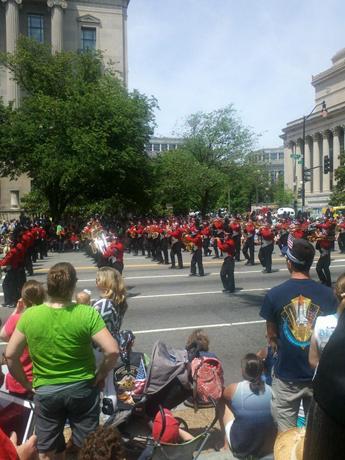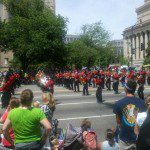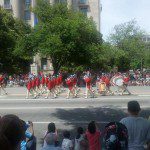Memorial Day: the Heart of the Matter and Meaning of America
By • June 2, 2014 0 1311

If you watched the news or read it in the slim holiday editions of the dailies, you might think the world was moving on with its usual mixture of tragedy, farce, shock and awe.
But weather, and time off, can be beguiling and almost make you forget that in Ukraine, there was a winner in the election, followed by an attack on an airport, and so the crisis remained. You could almost—almost—forget the terrible words of the young killer in his bitter lack-of-a-valentine to the world, before he began knifing and shooting people in the normally bucolic, essence-of-California-dreaming Santa Barbara area.
In a long weekend suffused with the joy of everyday things like sunshine, the really red readiness of tomatoes at a market stall, finding the perfect rhubarb pie, you could even almost forget the wretched excess of a let-them-eat-cake wedding of a Kardashian progeny to a rapper named West, who had named their child North and spent a couple of million on their nuptials.
In a weekend like that, you almost forgot the scandal that had reached its tipping point in the Veterans Administration and its care and the availability of care for our wounded veterans of wars going on for more than a decade now in the terrible, blasted landscapes of Iraq and Afghanistan.
Except, of course, this being Memorial Day Weekend in Washington, D.C, you couldn’t forget that—not when there was the annual presidential wreath laying at the Tomb of the Unknown Soldier, nor when there are so many men in old uniforms in town. These men with often fragile, thin bodies of what is left of the Greatest Generation made their way to the World War II Memorial—ten years old now—their ranks thinning, accompanied by family and accepting salutes. The tanned, often tattooed men of Viet Nam were there, roaring in with Rolling Thunder, or touching the names on the wall. None of them could quite ignore the lack of care, the careless caregiving that emerged like a reproach in the media. The president noticed, and so did we all.
In this town, on Memorial Day, we noticed them—from the wars of the last century and this one. Honors bestowed on the passed and fallen soldiers, the survivors, their families, made the weather-perfect day, not only ideal but somber and big with feeling. On the wall, at the memorial wreaths, at the white-crossed cemetery, and at the parade, it was about them—and about us, too.
The parade was quiet in some ways, not loaded with thousands of spectators, but enough to fill the hot-cement sidewalks from 7th Street to 17th Street, as high school marching bands came along, the twirlers, the trombones, the drum majors, bright in their uniforms and energy, from all over the country, playing America and patriotic themes, followed by facsimiles or the real ones from all of our wars—those fife and drum corps from the Revolutionary War, ladies in crinolines and old men in long white bears, the flags of the United States and the Confederacy marching oddly side by side. One time, everyone stopped and someone played “Taps.”
Down at the National World War II Memorial, there was a group gathered around a thin man in a brown uniform, family it was, and he was in a wheelchair and his name was Philip Adinolfi. He was there with family and his wife of 60 years, Grace. He wore corporal stripes and had served in distant Egypt in the Army Air Corps, when America’s newly minted army took on the armies of Field Marshall Erwin Rommel in North Africa. A young captain with his son walked up to him and saluted him, and the boy shook his hand, and a tanned Viet Nam vet shook his hand in respect. He had been there the year before, talking with a D-Day veteran of the Omaha Beach landing in Normandy 70 years ago.
On this day, the school bands came on in rolling notes of music, signaled by the brass. They had come from Adamsville, Tenn.; Bryan, Texas; Rayland, Ohio; Cape Coral Fla; a place called Kahoka, Mo.; Coventry, Conn.; Tarpon Springs, Fla; Gaffney, S.C.; Hazelton, Pa; China Grove, N.C.; Pomeroy, Ohio; North Platte, Neb.; Franklin Lakes, N.J.
There were all sorts of people along the way, the family of man, and their children, and grandchildren and pets. In the parade, was a band of the Hero Dogs, honoring the canines who served in Iraq and Afghanistan and had made it home, too—mostly labs and goldens who loved the attention and marched in little soft boots to protect their paws from the hot cement.
On this day, there were Miss America Nina Davuluri, other beauty and prom queens and astronauts and a veteran of the Doolittle Raid over Tokyo. Lt. Colonel Richard Cole, Jimmy Doolittle’s co-pilot in April 1942, served as the parade’s grand marshall. There were Lion Clubs and large photographs of the long-ago youthful soldiers. There was a mother and her three daughters, whose father had been killed in Afghanistan.
There we were on May 24, 2014, in the bright sun, cheering, saluting, shaking hands, giving respect, united in our awe and love for them, their respect painfully earned and deserving of the best. We stood and sat under trees or on curbs. We watched and whistled and remembered neither Kanye nor Kim nor somewhere in Ukraine nor a demented killer in California. We remembered, instead, history marching by.
- National Memorial Day Parade 2014. | Joseph Park



